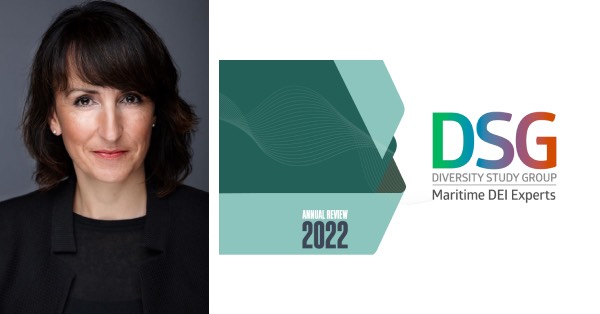• Continued calls from employees for DEI action and training
• Concerns over willingness to report discrimination
The shipping industry is making progress on diversity, equity, and inclusion , according to the results of the 2022 Annual Review from the Diversity Study Group. This progress is most evident in junior and mid-level ranks, helping to build a more diverse talent pool of future leaders, but diverse representation remains far more limited at C-suite level.
This is the third annual report from the Diversity Study Group (DSG), a membership organisation dedicated to fostering a more diverse, equitable and inclusive shipping and maritime sector.
The report is based on the responses from over 3,000 participants from a wide range of corporate members, including ship owners, operators and managers, class societies and marine services firms. It covers every part of the globe and a wide spectrum of respondents, in age, seniority, nationality, professional background and other characteristics.

Growing female and ethnic diversity below C-suite
The report shows that there is still a significant lack of ethnic diversity and female representation in senior roles, although representation at lower-level roles is improving. C-suite and Heads of Department roles are predominantly held by white respondents, with roughly a quarter of roles headed by those identifying as Asian.
Encouragingly, the report shows progress with women starting to break through in greater numbers below the C-suite level, where 17.9% of this year’s respondents are women. Women comprise 23.8% of Heads of Department, an increase from just 12.3% last year. This year, 38.3% of those at the Team Leader level are women, up from 29% last year. Finally, female representation at the Junior/Trainee level remains high at 56.7% and at 48% at the Midlevel position.

Appetite for action on DEI
Only 36.2% of respondents said that DEI-related training is available to them. 49% said that it is not. 37% of respondents also said that their employer could be doing more to achieve a diverse and inclusive workplace. Many respondents indicated a strong interest in knowing more about the DEI agenda and understanding their role in creating positive and inclusive working environments.
Concerns remain over reporting discrimination
35.8% of women responded that they do not feel that they can raise discrimination concerns at work or declared they would “prefer not to say”. This suggests there may be some reluctance among women to ‘rock the boat’ if they face discrimination.
85.4% of respondents responded that they could ‘be themselves’ at work, which is a positive sign. Employees identifying as white feel most confident and those identifying as minority ethnic or LGBT+ are the least.
For the first time in the three-year history of the DSG Annual Review, the report also collected data on three new areas: disability, gender identity and sexual orientation.
Heidi Heseltine, Founder of the Diversity Study Group, said:
“This year’s results reveal some fascinating insights on the state of DEI in shipping. Whilst there is still a lack of diversity at the senior level, there are signs of a growing ‘waiting room’ of more diverse talent below the C-suite. The onus is on employers is to provide the development support and opportunities that help them to fulfil their potential, in order to see real diversity in leadership positions.
“This is the third year that the Diversity Study Group has conducted our annual review and we have had a record number of responses from our members’ employees. This also allows us to benchmark progress on DEI in the shipping industry by tracking progress over time.
“There is further work to do in building up more robust data in some areas, which is why we have described some of our findings as indicative rather than definitive, but those gaps are closing over time and we are confident that the results of the 2022 Annual Review provide a firm basis upon which we can draw point to some clear trends in shipping’s DEI performance.”
As Heidi explains, DEI is important not only because it is ethically the right thing to do, but also because it makes good sense commercially for an industry in urgent need of a wider talent pool:
“It is to everyone’s benefit for our sector to be attractive to people from a broad range of backgrounds, where they can thrive. Not only does shipping face global talent shortages, but organisations also require broader skill sets to tackle environmental challenges and technological advances.
“The progress being made on DEI is encouraging, as is the growing collaboration between shipping companies. However, hard-won momentum can be easily lost. Now is the time for organisations to double down on their commitment to DEI, whether they are a leader or taking their first steps.
“We are grateful to our pioneering member organisations for their support in raising awareness of DEI through our core values of community, collaboration and change. If your organisation is at the early stages of putting in place a DEI strategy, you can get in touch with us for advice and support. Access to DSG’s membership community brings a wide range of collaborative and networking benefits, in addition to the DEI in maritime data benchmarking support.”









































